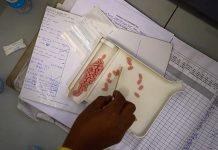Africa-Press – Lesotho. Over the past two decades, the malaria drug story has developed apace. MMV was founded twenty years ago in the face of an alarming reality – the malaria drug pipeline was dry.
In contrast, today, there are 11 newly launched products that have been brought forward by MMV and partners that have made an immeasurable difference in the fight against the disease. These medicines are estimated to have saved more than two million lives.
And behind those there are many more drugs being developed to address further gaps in the malaria treatment toolbox and showing incredible promise – we now have the richest antimalarial pipeline in history.
Today, we are seeing global cases of malaria on the rise again – the World Health Organization’s (WHO’s) World Malaria Report reveals an eight million increase in cases between 2015 and 2017.
Further, according to WHO, less than 1% of funding for health R&D investment goes to developing tools to tackle malaria – the deadliest disease in history.
The reality is that to achieve our shared vision of a malaria-free world, we cannot rely on current tools and methods alone – we need greater innovation to fight back against the continually evolving parasite.
Countries are working hard to build National Malaria Control Programmes, the Global Fund to Fight AIDS, Tuberculosis and Malaria secured US$14 billion in funding to help fight malaria last month, and grassroots movements to counter malaria are growing across the globe. In this context, the scientific community has a responsibility to ensure countries have access to the tools that will end malaria for good.
This September, the World Health Organization (WHO) Strategic Advisory Group on Malaria Eradication (SAGme) and the Lancet Commission on Malaria Eradication both released scientific reports that highlight that eradication is possible, but only with new, transformative tools will we achieve this goal.
Continued innovation and drug development remain critical in the fight against malaria, if, for example, the drug resistance emerging in Southeast Asia takes root and becomes more widespread, current medicines will become ineffective and without new medicines, cases of malaria will increase rapidly.
We’ve seen before how drug resistance can damage years of progress; the 1950s global malaria eradication campaign was thwarted by resistance to chloroquine.
Today, we are witnessing scientific progress enabling us to achieve things we once only dreamed possible. Just last month, the first single-dose cure for relapsing malaria, tafenoquine, was approved in the first malaria-endemic country, Brazil.
Meanwhile, innovative ways of ensuring access to quality-assured tools like rectal artesunate are saving lives today – the treatment “buys time” to get young children suffering from severe malaria to health facilities where they can receive the full treatment they need.
Which promising compounds will be combined into the next generation antimalarial, we are yet to find out, but we all agree that it will be innovation that takes us to our final destination – global eradication of malaria.
There will be challenges on the road to our destination. Today, insecticide and drug resistance put our brightest scientists to the test. Lengthy development times, complex regulation and low-profit margins present innovation challenges, and we must work together to overcome them.
Looking ahead to the next 20 years, it will be new ways of doing things that will increase the pace and magnitude of change. However, we cannot do this without high-level political commitment, alongside increased domestic investment and ownership in malaria-endemic countries.
For countries affected by the disease, it’s an investment that’s inextricably linked to the goal of Universal Health Coverage and will undoubtedly boost economic activity and sustainable development.
At MMV, we remain committed to our role as custodian of the discovery, development and delivery of malaria medicines, bringing together researchers, health agencies and the pharmaceutical industry to fight the parasite.
We are developing the medicines of the future, championing the next generation of malaria researchers, building capacity in endemic countries, and advancing access to quality treatments where they’re needed most.
Together, with new approaches and input from experts both within and outside of the malaria community, I have no doubt that we can assign malaria to the history books.
For More News And Analysis About Lesotho Follow Africa-Press






